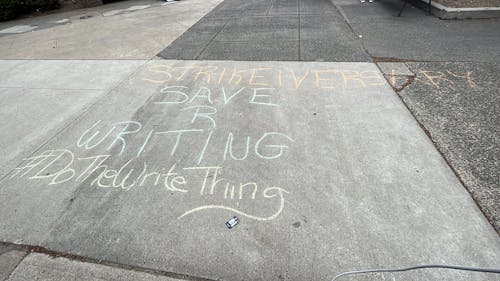Faculty Unions observe 1st 'Strike-iversary' in face of 93 percent of Writing Program layoffs

On Wednesday, an event memorializing the one-year anniversary of the University faculty strike also pushed for changes in the Writing Program at Rutgers—New Brunswick after most of the program's part-time faculty were laid off.
The Rutgers American Association of University Professors and American Federation of Teachers (AAUP-AFT), the Part-Time Lecturers Faculty Chapter (PTLFC) and the American Association of University Professors—Biomedical and Health Sciences of New Jersey co-hosted the event, titled "Strike-iversary Speakout and March to Defend Our University," which took place at Voorhees Mall on the College Avenue campus, much like the strike in April 2023.
Strikers planned to walk to nearby Winants Hall to deliver the unions' petition against proposed class size increases and layoffs in the Writing Program. Yet rain and dwindling numbers halted their travel.
Hank Kalet, the vice president of the Rutgers—New Brunswick Adjunct Faculty Union (PTLFC-AAUP-AFT) and part-time lecturer in the Department of Journalism and Media Studies, said the unions' event was in conjunction with the National Day of Action for Higher Education, which calls upon university-based unions to take action toward union goals through events, such as walkouts and demonstrations.
The event featured a series of speakers, including Kalet, a Rutgers—New Brunswick Barnes & Noble union member and a student in the Writing Program.
"Rutgers administration: Let it be known. We see what you do, and we will push until you pay people what they deserve. No longer will you steal from the working class. No longer will you steal from these brilliant professors. We are strong together. I love you all. Organize against your masters," the student said, followed by chants.
Chants included "Resistance is justified when you let writing programs die," "Rutgers, Rutgers, we see you. We know you don't follow through" and "Pay your staff."
An organizer at the event then called for attendees to begin the walk to Winants Hall. They also said they would stop to chant in front of the office of Juli Wade, the executive dean of the School of Arts and Sciences.
Union leadership also spoke with The Daily Targum about this upcoming academic year's cuts to the Writing Program, as well as general issues faced by part-time faculty.
"It's manufactured austerity. There is no financial crisis here. They have plenty of millions of dollars that they can throw at the football program. But they're laying off 30 adjunct faculty that's saving, what, less than a million dollars ... So, it's disgusting. And we're gonna fight them," Todd Wolfson, the president of Rutgers AAUP-AFT and an associate professor in the Department of Journalism and Media Studies, said.
Shelby Wardlaw, the vice president of non-tenure-track faculty for the Rutgers AAUP-AFT and an assistant teaching professor in the Writing Program, said the layoffs increase workload for the remaining faculty. For her, this recent cut equates to a 5 percent increase in her workload without additional compensation.
According to a flyer distributed at the event, 29 of 31 part-time lecturers will lose employment at the University as of the Fall 2024 semester.
One such faculty member, Howie Swerdloff, a lecturer in the Writing Program and secretary of the PTLFC-AAUP-AFT, said he was laid off after 14 years at the University. He received a text message telling him to check his email, in which he saw a message from the director of the Writing Program that informed faculty that many lecturers would not be returning for the Fall 2024 semester.
Swerdloff, who was driving at the time, said he had to pull over to process the information.
"I got to class, and I was still shaking," he said. "And I read the letter to my class and the students were (like,) 'You should go on strike.'"
Additionally, Swerdloff said there is a proposal to raise class caps in Fall 2024, with a given class's maximum enrollment increasing from 22 students to 24. At the same time, many course sections in the Writing Program are being cut.
He also discussed a similar issue at the Graduate School of Education, in which courses are reportedly being redistributed to group students into two classes with 30 students each as opposed to three classes with 20 students each, thereby effectively receiving two-thirds of their original pay.
Kalet said this hurts adjunct faculty because they are paid per course, unlike their full-time counterparts, so if a class does not run, then a lecturer will not receive compensation.
Kalet, who is also the chair of the Academic Freedom Committee in the PTLFC-AAUP-AFT, noted that part-time faculty also do not have the same contractual protections as full-time faculty. He said these conditions make the classroom environment tense for educators as they observe which students may be uncomfortable when discussing certain topics, as students may report them.
While he is not aware of the specifics of a student complaint process, he said faculty members in areas like history, political science and journalism are on edge, as their classes often revolve around current events.
"We have a choice at Rutgers and throughout higher ed," Kalet said. "Be complacent, and ultimately complicit, or fight to ensure the phrase 'academic freedom' continues to have meaning."



